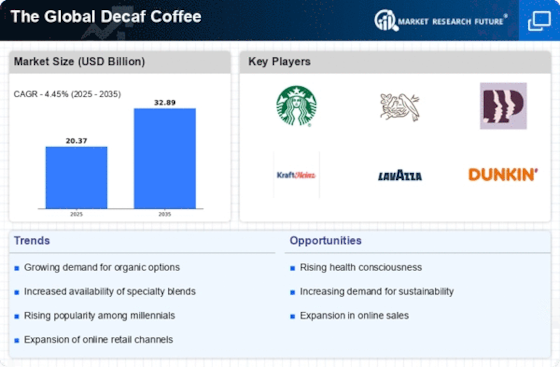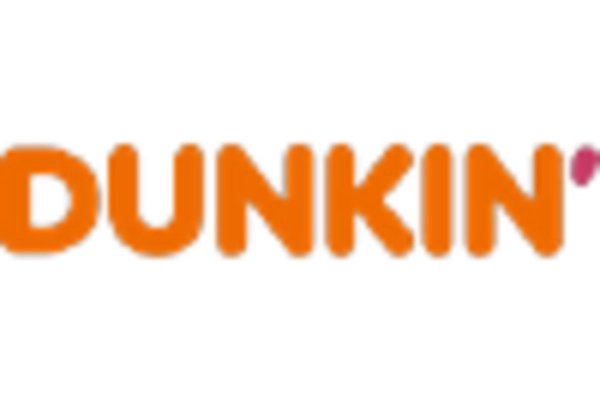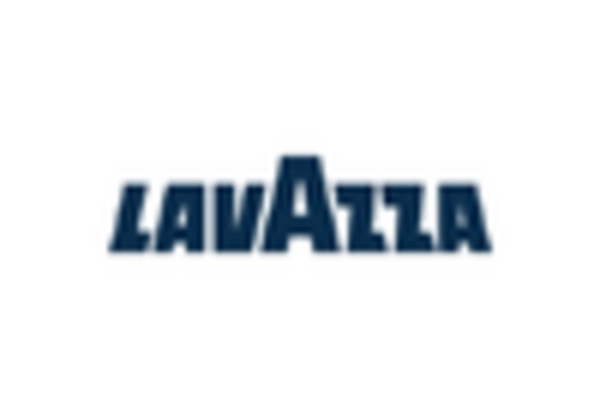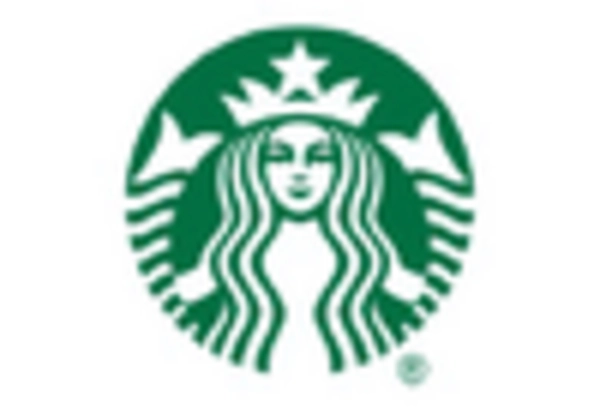-
EXECUTIVE SUMMARY
-
MARKET INTRODUCTION
-
Market Definition
-
Scope of the Study
- Research Objectives
- Assumptions & Limitations
-
Market Structure
-
MARKET RESEARCH METHODOLOGY
-
Research Process
-
Secondary Research
-
Primary Research
-
Forecast Model
-
MARKET LANDSCAPE
-
Supply Chain Analysis
- Raw Material Suppliers
- Manufacturers/Producers
- Distributors/Retailers/Wholesalers/E-Commerce
- End Users
-
Porter’s Five Forces Analysis
- Threat of New Entrants
- Bargaining Power of Buyers
- Bargaining Power of Suppliers
- Threat of Substitutes
- Internal Rivalry
-
MARKET DYNAMICS OF THE GLOBAL DECAF COFFEE MARKET
-
Introduction
-
Drivers
-
Restraints
-
Opportunities
-
Challenges
-
GLOBAL DECAF COFFEE MARKET, BY TYPE
-
Introduction
-
Arabica
- Market Estimates & Forecast, 2022–2030
- Market Estimates & Forecast, by Region, 2022–2030
-
Robusta
- Market Estimates & Forecast, 2022–2030
- Market Estimates & Forecast, by Region, 2022–2030
-
Others
- Market Estimates & Forecast, 2022–2030
- Market Estimates & Forecast, by Region, 2022–2030
-
GLOBAL DECAF COFFEE MARKET, BY CATEGORY
-
Introduction
-
Organic
- Market Estimates & Forecast, 2022–2030
- Market Estimates & Forecast, by Region, 2022–2030
-
Conventional
- Market Estimates & Forecast, 2022–2030
- Market Estimates & Forecast, by Region, 2022–2030
-
GLOBAL DECAF COFFEE MARKET, BY FORM
-
Introduction
-
Whole
- Market Estimates & Forecast, 2022–2030
- Market Estimates & Forecast, by Region, 2022–2030
-
Ground
- Market Estimates & Forecast, 2022–2030
- Market Estimates & Forecast, by Region, 2022–2030
- Instant Coffee Powder
- Portioned Coffee
-
Others
- Market Estimates & Forecast, 2022–2030
- Market Estimates & Forecast, by Region, 2022–2030
-
GLOBAL DECAF COFFEE MARKET, BY DISTRIBUTION CHANNEL
-
Introduction
-
Store-Based
- Market Estimates & Forecast, 2022–2030
- Market Estimates & Forecast, by Region, 2022–2030
- Hypermarkets & Supermarkets
- Convenience Stores
- Others
-
Non-Store-Based
- Market Estimates & Forecast, 2022–2030
- Market Estimates & Forecast, by Region, 2022–2030
-
GLOBAL DECAF COFFEE MARKET, BY REGION
-
Introduction
-
North America
- Market Estimates & Forecast, 2022–2030
- Market Estimates & Forecast, by Type, 2022–2030
- Market Estimates & Forecast, by Category, 2022–2030
- Market Estimates & Forecast, by Form, 2022–2030
- Market Estimates & Forecast, by Distribution Channel, 2022–2030
- Market Estimates & Forecast, by Country, 2022–2030
- US
- Canada
- Mexico
-
Europe
- Market Estimates & Forecast, 2022–2030
- Market Estimates & Forecast, by Type, 2022–2030
- Market Estimates & Forecast, by Category, 2022–2030
- Market Estimates & Forecast, by Form, 2022–2030
- Market Estimates & Forecast, by Distribution Channel, 2022–2030
- Market Estimates & Forecast, by Country, 2022–2030
- Germany
- UK
- France
- Spain
- Italy
- Rest of Europe
-
Asia-Pacific
- Market Estimates & Forecast, 2022–2030
- Market Estimates & Forecast, by Type, 2022–2030
- Market Estimates & Forecast, by Category, 2022–2030
- Market Estimates & Forecast, by Form, 2022–2030
- Market Estimates & Forecast, by Distribution Channel, 2022–2030
- Market Estimates & Forecast, by Country, 2022–2030
- China
- Japan
- India
- Australia & New Zealand
- Rest of Asia-Pacific
-
Rest of the World
- Market Estimates & Forecast, 2022–2030
- Market Estimates & Forecast, by Type, 2022–2030
- Market Estimates & Forecast, by Category, 2022–2030
- Market Estimates & Forecast, by Form, 2022–2030
- Market Estimates & Forecast, by Distribution Channel, 2022–2030
- Market Estimates & Forecast, by Region, 2022–2030
- South America
- Middle East
- Africa
-
COMPETITIVE LANDSCAPE
-
Introduction
-
Market Strategy
-
Key Development Analysis
-
(Expansions/Mergers & Acquisitions/Joint Ventures/New Product Developments/Agreements/Investments)
-
COMPANY PROFILES
-
Don Pablo Coffee
- Company Overview
- Financial Updates
- Product/Business Segment Overview
- Strategies
- Key Developments
- SWOT Analysis
-
The Kraft Heinz Company
- Company Overview
- Financial Updates
- Product/Business Segment Overview
- Strategies
- Key Developments
- SWOT Analysis
-
Cravium Foods LLP
- Company Overview
- Financial Updates
- Product/Business Segment Overview
- Strategies
- Key Developments
- SWOT Analysis
-
Colombian Brew Ground Coffee
- Company Overview
- Financial Updates
- Product/Business Segment Overview
- Strategies
- Key Developments
- SWOT Analysis
-
Nestlé S.A.
- Company Overview
- Financial Updates
- Product/Business Segment Overview
- Strategies
- Key Developments
- SWOT Analysis
-
Lifeboost Coffee
- Company Overview
- Financial Updates
- Product/Business Segment Overview
- Strategies
- Key Developments
- SWOT Analysis
-
Dunkin'' Brands Group, Inc.
- Company Overview
- Financial Updates
- Product/Business Segment Overview
- Strategies
- Key Developments
- SWOT Analysis
-
Fresh Roasted Coffee LLC
- Company Overview
- Financial Updates
- Product/Business Segment Overview
- Strategies
- Key Developments
- SWOT Analysis
-
Volcanica Coffee, LLC
- Company Overview
- Financial Updates
- Product/Business Segment Overview
- Strategies
- Key Developments
- SWOT Analysis
-
Kicking Horse Coffee Co. Ltd.
- Company Overview
- Financial Updates
- Product/Business Segment Overview
- Strategies
- Key Developments
- SWOT Analysis
-
Koffee Kult
- Company Overview
- Financial Updates
- Product/Business Segment Overview
- Strategies
- Key Developments
- SWOT Analysis
-
Eight O’Clock Coffee Company
- Company Overview
- Financial Updates
- Product/Business Segment Overview
- Strategies
- Key Developments
- SWOT Analysis
-
Cafedirect PLC
- Company Overview
- Financial Updates
- Product/Business Segment Overview
- Strategies
- Key Developments
- SWOT Analysis
-
Grindhouse Coffee Roasters
- Company Overview
- Financial Updates
- Product/Business Segment Overview
- Strategies
- Key Developments
- SWOT Analysis
-
Luigi Lavazza S.P.A.
- Company Overview
- Financial Updates
- Product/Business Segment Overview
- Strategies
- Key Developments
- SWOT Analysis
-
CONCLUSION
-
LIST OF TABLES
-
Global Decaf Coffee Market, by Region, 2022–2030 (USD Million)
-
Global Decaf Coffee Market, by Type, 2022–2030 (USD Million)
-
Global Decaf Coffee Market, by Category,2022–2030 (USD Million)
-
Global Decaf Coffee Market, by Form, 2022–2030 (USD Million)
-
Global Decaf Coffee Market, by Distribution Channel, 2022–2030 (USD Million)
-
North America: Decaf Coffee Market, by Country, 2022–2030 (USD Million)
-
North America: Decaf Coffee Market, by Type, 2022–2030 (USD Million)
-
North America: Decaf Coffee Market, by Category,2022–2030 (USD Million)
-
North America: Decaf Coffee Market, by Form, 2022–2030 (USD Million)
-
North America: Decaf Coffee Market, by Distribution Channel, 2022–2030 (USD Million)
-
US: Decaf Coffee Market, by Type, 2022–2030 (USD Million)
-
US: Decaf Coffee Market, by Category,2022–2030 (USD Million)
-
US: Decaf Coffee Market, by Form, 2022–2030 (USD Million)
-
US: Decaf Coffee Market, by Distribution Channel, 2022–2030 (USD Million)
-
Canada: Decaf Coffee Market, by Type, 2022–2030 (USD Million)
-
Canada: Decaf Coffee Market, by Category,2022–2030 (USD Million)
-
Canada: Decaf Coffee Market, by Form, 2022–2030 (USD Million)
-
Canada: Decaf Coffee Market, by Distribution Channel, 2022–2030 (USD Million)
-
Mexico: Decaf Coffee Market, by Type, 2022–2030 (USD Million)
-
Mexico: Decaf Coffee Market, by Category,2022–2030 (USD Million)
-
Mexico: Decaf Coffee Market, by Form, 2022–2030 (USD Million)
-
Mexico: Decaf Coffee Market, by Distribution Channel, 2022–2030 (USD Million)
-
Europe: Decaf Coffee Market, by Country, 2022–2030 (USD Million)
-
Europe: Decaf Coffee Market, by Type, 2022–2030 (USD Million)
-
Europe: Decaf Coffee Market, by Category,2022–2030 (USD Million)
-
Europe: Decaf Coffee Market, by Form, 2022–2030 (USD Million)
-
Europe: Decaf Coffee Market, by Distribution Channel, 2022–2030 (USD Million)
-
Germany: Decaf Coffee Market, by Type, 2022–2030 (USD Million)
-
Germany: Decaf Coffee Market, by Category,2022–2030 (USD Million)
-
Germany: Decaf Coffee Market, by Form, 2022–2030 (USD Million)
-
Germany: Decaf Coffee Market, by Distribution Channel, 2022–2030 (USD Million)
-
France: Decaf Coffee Market, by Type, 2022–2030 (USD Million)
-
France: Decaf Coffee Market, by Category,2022–2030 (USD Million)
-
France: Decaf Coffee Market, by Form, 2022–2030 (USD Million)
-
France: Decaf Coffee Market, by Distribution Channel, 2022–2030 (USD Million)
-
Italy: Decaf Coffee Market, by Type, 2022–2030 (USD Million)
-
Italy: Decaf Coffee Market, by Category,2022–2030 (USD Million)
-
Italy: Decaf Coffee Market, by Form, 2022–2030 (USD Million)
-
Italy: Decaf Coffee Market, by Distribution Channel, 2022–2030 (USD Million)
-
Spain: Decaf Coffee Market, by Type, 2022–2030 (USD Million)
-
Spain: Decaf Coffee Market, by Category,2022–2030 (USD Million)
-
Spain: Decaf Coffee Market, by Form, 2022–2030 (USD Million)
-
Spain: Decaf Coffee Market, by Distribution Channel, 2022–2030 (USD Million)
-
UK: Decaf Coffee Market, by Type, 2022–2030 (USD Million)
-
UK: Decaf Coffee Market, by Category,2022–2030 (USD Million)
-
UK: Decaf Coffee Market, by Form, 2022–2030 (USD Million)
-
UK: Decaf Coffee Market, by Distribution Channel, 2022–2030 (USD Million)
-
Rest of Europe: Decaf Coffee Market, by Type, 2022–2030 (USD Million)
-
Rest of Europe: Decaf Coffee Market, by Category,2022–2030 (USD Million)
-
Rest of Europe: Decaf Coffee Market, by Form, 2022–2030 (USD Million)
-
Rest of Europe: Decaf Coffee Market, by Distribution Channel, 2022–2030 (USD Million)
-
Asia-Pacific: Decaf Coffee Market, by Country, 2022–2030 (USD Million)
-
Asia-Pacific: Decaf Coffee Market, by Type, 2022–2030 (USD Million)
-
Asia-Pacific: Decaf Coffee Market, by Category,2022–2030 (USD Million)
-
Asia-Pacific: Decaf Coffee Market, by Form, 2022–2030 (USD Million)
-
Asia-Pacific: Decaf Coffee Market, by Distribution Channel, 2022–2030 (USD Million)
-
China: Decaf Coffee Market, by Type, 2022–2030 (USD Million)
-
China: Decaf Coffee Market, by Category,2022–2030 (USD Million)
-
China: Decaf Coffee Market, by Form, 2022–2030 (USD Million)
-
China: Decaf Coffee Market, by Distribution Channel, 2022–2030 (USD Million)
-
India: Decaf Coffee Market, by Type, 2022–2030 (USD Million)
-
India: Decaf Coffee Market, by Category,2022–2030 (USD Million)
-
India: Decaf Coffee Market, by Form, 2022–2030 (USD Million)
-
India: Decaf Coffee Market, by Distribution Channel, 2022–2030 (USD Million)
-
Japan: Decaf Coffee Market, by Type, 2022–2030 (USD Million)
-
Japan: Decaf Coffee Market, by Category,2022–2030 (USD Million)
-
Japan: Decaf Coffee Market, by Form, 2022–2030 (USD Million)
-
Japan: Decaf Coffee Market, by Distribution Channel, 2022–2030 (USD Million)
-
Australia & New Zealand: Decaf Coffee Market, by Type, 2022–2030 (USD Million)
-
Australia & New Zealand: Decaf Coffee Market, by Category,2022–2030 (USD Million)
-
Australia & New Zealand: Decaf Coffee Market, by Form, 2022–2030 (USD Million)
-
Australia & New Zealand: Decaf Coffee Market, by Distribution Channel, 2022–2030 (USD Million)
-
Rest of Asia-Pacific: Decaf Coffee Market, by Type, 2022–2030 (USD Million)
-
Rest of Asia-Pacific: Decaf Coffee Market, by Category,2022–2030 (USD Million)
-
Rest of Asia-Pacific: Decaf Coffee Market, by Form, 2022–2030 (USD Million)
-
Rest of Asia-Pacific: Decaf Coffee Market, by Distribution Channel, 2022–2030 (USD Million)
-
Rest of the World (RoW): Decaf Coffee Market, by Region 2022–2030 (USD Million)
-
Rest of the World (RoW): Decaf Coffee Market, by Type, 2022–2030 (USD Million)
-
Rest of the World (RoW): Decaf Coffee Market, by Category,2022–2030 (USD Million)
-
Rest of the World (RoW): Decaf Coffee Market, by Form, 2022–2030 (USD Million)
-
Rest of the World (RoW): Decaf Coffee Market, by Distribution Channel, 2022–2030 (USD Million)
-
South America: Decaf Coffee Market, by Type, 2022–2030 (USD Million)
-
South America: Decaf Coffee Market, by Category,2022–2030 (USD Million)
-
South America: Decaf Coffee Market, by Form, 2022–2030 (USD Million)
-
South America: Decaf Coffee Market, by Distribution Channel, 2022–2030 (USD Million)
-
Middle East: Decaf Coffee Market, by Type, 2022–2030 (USD Million)
-
Middle East: Decaf Coffee Market, by Category,2022–2030 (USD Million)
-
Middle East: Decaf Coffee Market, by Form, 2022–2030 (USD Million)
-
Middle East: Decaf Coffee Market, by Distribution Channel, 2022–2030 (USD Million)
-
Africa: Decaf Coffee Market, by Type, 2022–2030 (USD Million)
-
Africa: Decaf Coffee Market, by Category,2022–2030 (USD Million)
-
Africa: Decaf Coffee Market, by Form, 2022–2030 (USD Million)
-
Africa: Decaf Coffee Market, by Distribution Channel, 2022–2030 (USD Million)
-
LIST OF FIGURES
-
Global Decaf Coffee Market Segmentation
-
Forecast Research Methodology
-
Five Forces Analysis of the Global Decaf Coffee Market
-
Value Chain of the Global Decaf Coffee Market
-
Share of the Global Decaf Coffee Market in 2020 by Country (%)
-
Global Decaf Coffee Market, by Region, 2022–2030
-
Global Decaf Coffee Market Size, by Type, 2020
-
Share of the Global Decaf Coffee Market, by Type, 2022–2030 (%)
-
Global Decaf Coffee Market Size, by Category, 2020
-
Share of the Global Decaf Coffee Market, by Category, 2022–2030 (%)
-
Global Decaf Coffee Market Size, by Form, 2020
-
Share of the Global Decaf Coffee Market, by Form, 2022–2030 (%)
-
Global DecTable of Contents
-
EXECUTIVE SUMMARY
-
MARKET INTRODUCTION
-
Market Definition
-
Scope of the Study
- Research Objectives
- Assumptions & Limitations
-
Market Structure
-
MARKET RESEARCH METHODOLOGY
-
Research Process
-
Secondary Research
-
Primary Research
-
Forecast Model
-
MARKET LANDSCAPE
-
Supply Chain Analysis
- Raw Material Suppliers
- Manufacturers/Producers
- Distributors/Retailers/Wholesalers/E-Commerce
- End Users
-
Porter’s Five Forces Analysis
- Threat of New Entrants
- Bargaining Power of Buyers
- Bargaining Power of Suppliers
- Threat of Substitutes
- Internal Rivalry
-
MARKET DYNAMICS OF THE GLOBAL DECAF COFFEE MARKET
-
Introduction
-
Drivers
-
Restraints
-
Opportunities
-
Challenges
-
GLOBAL DECAF COFFEE MARKET, BY TYPE
-
Introduction
-
Arabica
- Market Estimates & Forecast, 2022–2030
- Market Estimates & Forecast, by Region, 2022–2030
-
Robusta
- Market Estimates & Forecast, 2022–2030
- Market Estimates & Forecast, by Region, 2022–2030
-
Others
- Market Estimates & Forecast, 2022–2030
- Market Estimates & Forecast, by Region, 2022–2030
-
GLOBAL DECAF COFFEE MARKET, BY CATEGORY
-
Introduction
-
Organic
- Market Estimates & Forecast, 2022–2030
- Market Estimates & Forecast, by Region, 2022–2030
-
Conventional
- Market Estimates & Forecast, 2022–2030
- Market Estimates & Forecast, by Region, 2022–2030
-
GLOBAL DECAF COFFEE MARKET, BY FORM
-
Introduction
-
Whole
- Market Estimates & Forecast, 2022–2030
- Market Estimates & Forecast, by Region, 2022–2030
-
Ground
- Market Estimates & Forecast, 2022–2030
- Market Estimates & Forecast, by Region, 2022–2030
- Instant Coffee Powder
- Portioned Coffee
-
Others
- Market Estimates & Forecast, 2022–2030
- Market Estimates & Forecast, by Region, 2022–2030
-
GLOBAL DECAF COFFEE MARKET, BY DISTRIBUTION CHANNEL
-
Introduction
-
Store-Based
- Market Estimates & Forecast, 2022–2030
- Market Estimates & Forecast, by Region, 2022–2030
- Hypermarkets & Supermarkets
- Convenience Stores
- Others
-
Non-Store-Based
- Market Estimates & Forecast, 2022–2030
- Market Estimates & Forecast, by Region, 2022–2030
-
GLOBAL DECAF COFFEE MARKET, BY REGION
-
Introduction
-
North America
- Market Estimates & Forecast, 2022–2030
- Market Estimates & Forecast, by Type, 2022–2030
- Market Estimates & Forecast, by Category, 2022–2030
- Market Estimates & Forecast, by Form, 2022–2030
- Market Estimates & Forecast, by Distribution Channel, 2022–2030
- Market Estimates & Forecast, by Country, 2022–2030
- US
- Canada
- Mexico
-
Europe
- Market Estimates & Forecast, 2022–2030
- Market Estimates & Forecast, by Type, 2022–2030
- Market Estimates & Forecast, by Category, 2022–2030
- Market Estimates & Forecast, by Form, 2022–2030
- Market Estimates & Forecast, by Distribution Channel, 2022–2030
- Market Estimates & Forecast, by Country, 2022–2030
- Germany
- UK
- France
- Spain
- Italy
- Rest of Europe
-
Asia-Pacific
- Market Estimates & Forecast, 2022–2030
- Market Estimates & Forecast, by Type, 2022–2030
- Market Estimates & Forecast, by Category, 2022–2030
- Market Estimates & Forecast, by Form, 2022–2030
- Market Estimates & Forecast, by Distribution Channel, 2022–2030
- Market Estimates & Forecast, by Country, 2022–2030
- China
- Japan
- India
- Australia & New Zealand
- Rest of Asia-Pacific
-
Rest of the World
- Market Estimates & Forecast, 2022–2030
- Market Estimates & Forecast, by Type, 2022–2030
- Market Estimates & Forecast, by Category, 2022–2030
- Market Estimates & Forecast, by Form, 2022–2030
- Market Estimates & Forecast, by Distribution Channel, 2022–2030
- Market Estimates & Forecast, by Region, 2022–2030
- South America
- Middle East
- Africa
-
COMPETITIVE LANDSCAPE
-
Introduction
-
Market Strategy
-
Key Development Analysis
-
(Expansions/Mergers & Acquisitions/Joint Ventures/New Product Developments/Agreements/Investments)
-
COMPANY PROFILES
-
Don Pablo Coffee
- Company Overview
- Financial Updates
- Product/Business Segment Overview
- Strategies
- Key Developments
- SWOT Analysis
-
The Kraft Heinz Company
- Company Overview
- Financial Updates
- Product/Business Segment Overview
- Strategies
- Key Developments
- SWOT Analysis
-
Cravium Foods LLP
- Company Overview
- Financial Updates
- Product/Business Segment Overview
- Strategies
- Key Developments
- SWOT Analysis
-
Colombian Brew Ground Coffee
- Company Overview
- Financial Updates
- Product/Business Segment Overview
- Strategies
- Key Developments
- SWOT Analysis
-
Nestlé S.A.
- Company Overview
- Financial Updates
- Product/Business Segment Overview
- Strategies
- Key Developments
- SWOT Analysis
-
Lifeboost Coffee
- Company Overview
- Financial Updates
- Product/Business Segment Overview
- Strategies
- Key Developments
- SWOT Analysis
-
Dunkin'' Brands Group, Inc.
- Company Overview
- Financial Updates
- Product/Business Segment Overview
- Strategies
- Key Developments
- SWOT Analysis
-
Fresh Roasted Coffee LLC
- Company Overview
- Financial Updates
- Product/Business Segment Overview
- Strategies
- Key Developments
- SWOT Analysis
-
Volcanica Coffee, LLC
- Company Overview
- Financial Updates
- Product/Business Segment Overview
- Strategies
- Key Developments
- SWOT Analysis
-
Kicking Horse Coffee Co. Ltd.
- Company Overview
- Financial Updates
- Product/Business Segment Overview
- Strategies
- Key Developments
- SWOT Analysis
-
Koffee Kult
- Company Overview
- Financial Updates
- Product/Business Segment Overview
- Strategies
- Key Developments
- SWOT Analysis
-
Eight O’Clock Coffee Company
- Company Overview
- Financial Updates
- Product/Business Segment Overview
- Strategies
- Key Developments
- SWOT Analysis
-
Cafedirect PLC
- Company Overview
- Financial Updates
- Product/Business Segment Overview
- Strategies
- Key Developments
- SWOT Analysis
-
Grindhouse Coffee Roasters
- Company Overview
- Financial Updates
- Product/Business Segment Overview
- Strategies
- Key Developments
- SWOT Analysis
-
Luigi Lavazza S.P.A.
- Company Overview
- Financial Updates
- Product/Business Segment Overview
- Strategies
- Key Developments
- SWOT Analysis
-
CONCLUSION
-
LIST OF TABLES
-
Global Decaf Coffee Market, by Region, 2022–2030 (USD Million)
-
Global Decaf Coffee Market, by Type, 2022–2030 (USD Million)
-
Global Decaf Coffee Market, by Category,2022–2030 (USD Million)
-
Global Decaf Coffee Market, by Form, 2022–2030 (USD Million)
-
Global Decaf Coffee Market, by Distribution Channel, 2022–2030 (USD Million)
-
North America: Decaf Coffee Market, by Country, 2022–2030 (USD Million)
-
North America: Decaf Coffee Market, by Type, 2022–2030 (USD Million)
-
North America: Decaf Coffee Market, by Category,2022–2030 (USD Million)
-
North America: Decaf Coffee Market, by Form, 2022–2030 (USD Million)
-
North America: Decaf Coffee Market, by Distribution Channel, 2022–2030 (USD Million)
-
US: Decaf Coffee Market, by Type, 2022–2030 (USD Million)
-
US: Decaf Coffee Market, by Category,2022–2030 (USD Million)
-
US: Decaf Coffee Market, by Form, 2022–2030 (USD Million)
-
US: Decaf Coffee Market, by Distribution Channel, 2022–2030 (USD Million)
-
Canada: Decaf Coffee Market, by Type, 2022–2030 (USD Million)
-
Canada: Decaf Coffee Market, by Category,2022–2030 (USD Million)
-
Canada: Decaf Coffee Market, by Form, 2022–2030 (USD Million)
-
Canada: Decaf Coffee Market, by Distribution Channel, 2022–2030 (USD Million)
-
Mexico: Decaf Coffee Market, by Type, 2022–2030 (USD Million)
-
Mexico: Decaf Coffee Market, by Category,2022–2030 (USD Million)
-
Mexico: Decaf Coffee Market, by Form, 2022–2030 (USD Million)
-
Mexico: Decaf Coffee Market, by Distribution Channel, 2022–2030 (USD Million)
-
Europe: Decaf Coffee Market, by Country, 2022–2030 (USD Million)
-
Europe: Decaf Coffee Market, by Type, 2022–2030 (USD Million)
-
Europe: Decaf Coffee Market, by Category,2022–2030 (USD Million)
-
Europe: Decaf Coffee Market, by Form, 2022–2030 (USD Million)
-
Europe: Decaf Coffee Market, by Distribution Channel, 2022–2030 (USD Million)
-
Germany: Decaf Coffee Market, by Type, 2022–2030 (USD Million)
-
Germany: Decaf Coffee Market, by Category,2022–2030 (USD Million)
-
Germany: Decaf Coffee Market, by Form, 2022–2030 (USD Million)
-
Germany: Decaf Coffee Market, by Distribution Channel, 2022–2030 (USD Million)
-
France: Decaf Coffee Market, by Type, 2022–2030 (USD Million)
-
France: Decaf Coffee Market, by Category,2022–2030 (USD Million)
-
France: Decaf Coffee Market, by Form, 2022–2030 (USD Million)
-
France: Decaf Coffee Market, by Distribution Channel, 2022–2030 (USD Million)
-
Italy: Decaf Coffee Market, by Type, 2022–2030 (USD Million)
-
Italy: Decaf Coffee Market, by Category,2022–2030 (USD Million)
-
Italy: Decaf Coffee Market, by Form, 2022–2030 (USD Million)
-
Italy: Decaf Coffee Market, by Distribution Channel, 2022–2030 (USD Million)
-
Spain: Decaf Coffee Market, by Type, 2022–2030 (USD Million)
-
Spain: Decaf Coffee Market, by Category,2022–2030 (USD Million)
-
Spain: Decaf Coffee Market, by Form, 2022–2030 (USD Million)
-
Spain: Decaf Coffee Market, by Distribution Channel, 2022–2030 (USD Million)
-
UK: Decaf Coffee Market, by Type, 2022–2030 (USD Million)
-
UK: Decaf Coffee Market, by Category,2022–2030 (USD Million)
-
UK: Decaf Coffee Market, by Form, 2022–2030 (USD Million)
-
UK: Decaf Coffee Market, by Distribution Channel, 2022–2030 (USD Million)
-
Rest of Europe: Decaf Coffee Market, by Type, 2022–2030 (USD Million)
-
Rest of Europe: Decaf Coffee Market, by Category,2022–2030 (USD Million)
-
Rest of Europe: Decaf Coffee Market, by Form, 2022–2030 (USD Million)
-
Rest of Europe: Decaf Coffee Market, by Distribution Channel, 2022–2030 (USD Million)
-
Asia-Pacific: Decaf Coffee Market, by Country, 2022–2030 (USD Million)
-
Asia-Pacific: Decaf Coffee Market, by Type, 2022–2030 (USD Million)
-
Asia-Pacific: Decaf Coffee Market, by Category,2022–2030 (USD Million)
-
Asia-Pacific: Decaf Coffee Market, by Form, 2022–2030 (USD Million)
-
Asia-Pacific: Decaf Coffee Market, by Distribution Channel, 2022–2030 (USD Million)
-
China: Decaf Coffee Market, by Type, 2022–2030 (USD Million)
-
China: Decaf Coffee Market, by Category,2022–2030 (USD Million)
-
China: Decaf Coffee Market, by Form, 2022–2030 (USD Million)
-
China: Decaf Coffee Market, by Distribution Channel, 2022–2030 (USD Million)
-
India: Decaf Coffee Market, by Type, 2022–2030 (USD Million)
-
India: Decaf Coffee Market, by Category,2022–2030 (USD Million)
-
India: Decaf Coffee Market, by Form, 2022–2030 (USD Million)
-
India: Decaf Coffee Market, by Distribution Channel, 2022–2030 (USD Million)
-
Japan: Decaf Coffee Market, by Type, 2022–2030 (USD Million)
-
Japan: Decaf Coffee Market, by Category,2022–2030 (USD Million)
-
Japan: Decaf Coffee Market, by Form, 2022–2030 (USD Million)
-
Japan: Decaf Coffee Market, by Distribution Channel, 2022–2030 (USD Million)
-
Australia & New Zealand: Decaf Coffee Market, by Type, 2022–2030 (USD Million)
-
Australia & New Zealand: Decaf Coffee Market, by Category,2022–2030 (USD Million)
-
Australia & New Zealand: Decaf Coffee Market, by Form, 2022–2030 (USD Million)
-
Australia & New Zealand: Decaf Coffee Market, by Distribution Channel, 2022–2030 (USD Million)
-
Rest of Asia-Pacific: Decaf Coffee Market, by Type, 2022–2030 (USD Million)
-
Rest of Asia-Pacific: Decaf Coffee Market, by Category,2022–2030 (USD Million)
-
Rest of Asia-Pacific: Decaf Coffee Market, by Form, 2022–2030 (USD Million)
-
Rest of Asia-Pacific: Decaf Coffee Market, by Distribution Channel, 2022–2030 (USD Million)
-
Rest of the World (RoW): Decaf Coffee Market, by Region 2022–2030 (USD Million)
-
Rest of the World (RoW): Decaf Coffee Market, by Type, 2022–2030 (USD Million)
-
Rest of the World (RoW): Decaf Coffee Market, by Category,2022–2030 (USD Million)
-
Rest of the World (RoW): Decaf Coffee Market, by Form, 2022–2030 (USD Million)
-
Rest of the World (RoW): Decaf Coffee Market, by Distribution Channel, 2022–2030 (USD Million)
-
South America: Decaf Coffee Market, by Type, 2022–2030 (USD Million)
-
South America: Decaf Coffee Market, by Category,2022–2030 (USD Million)
-
South America: Decaf Coffee Market, by Form, 2022–2030 (USD Million)
-
South America: Decaf Coffee Market, by Distribution Channel, 2022–2030 (USD Million)
-
Middle East: Decaf Coffee Market, by Type, 2022–2030 (USD Million)
-
Middle East: Decaf Coffee Market, by Category,2022–2030 (USD Million)
-
Middle East: Decaf Coffee Market, by Form, 2022–2030 (USD Million)
-
Middle East: Decaf Coffee Market, by Distribution Channel, 2022–2030 (USD Million)
-
Africa: Decaf Coffee Market, by Type, 2022–2030 (USD Million)
-
Africa: Decaf Coffee Market, by Category,2022–2030 (USD Million)
-
Africa: Decaf Coffee Market, by Form, 2022–2030 (USD Million)
-
Africa: Decaf Coffee Market, by Distribution Channel, 2022–2030 (USD Million)
-
LIST OF FIGURES
-
Global Decaf Coffee Market Segmentation
-
Forecast Research Methodology
-
Five Forces Analysis of the Global Decaf Coffee Market
-
Value Chain of the Global Decaf Coffee Market
-
Share of the Global Decaf Coffee Market in 2020 by Country (%)
-
Global Decaf Coffee Market, by Region, 2022–2030
-
Global Decaf Coffee Market Size, by Type, 2020
-
Share of the Global Decaf Coffee Market, by Type, 2022–2030 (%)
-
Global Decaf Coffee Market Size, by Category, 2020
-
Share of the Global Decaf Coffee Market, by Category, 2022–2030 (%)
-
Global Decaf Coffee Market Size, by Form, 2020
-
Share of the Global Decaf Coffee Market, by Form, 2022–2030 (%)
-
Global Decaf Coffee Market Size, by Distribution Channel, 2020
-
Share of the Global Decaf Coffee Market, by Distribution Channel, 2022–2030 (%)
-
af Coffee Market Size, by Distribution Channel, 2020
-
Share of the Global Decaf Coffee Market, by Distribution Channel, 2022–2030 (%)
-
'


















Leave a Comment